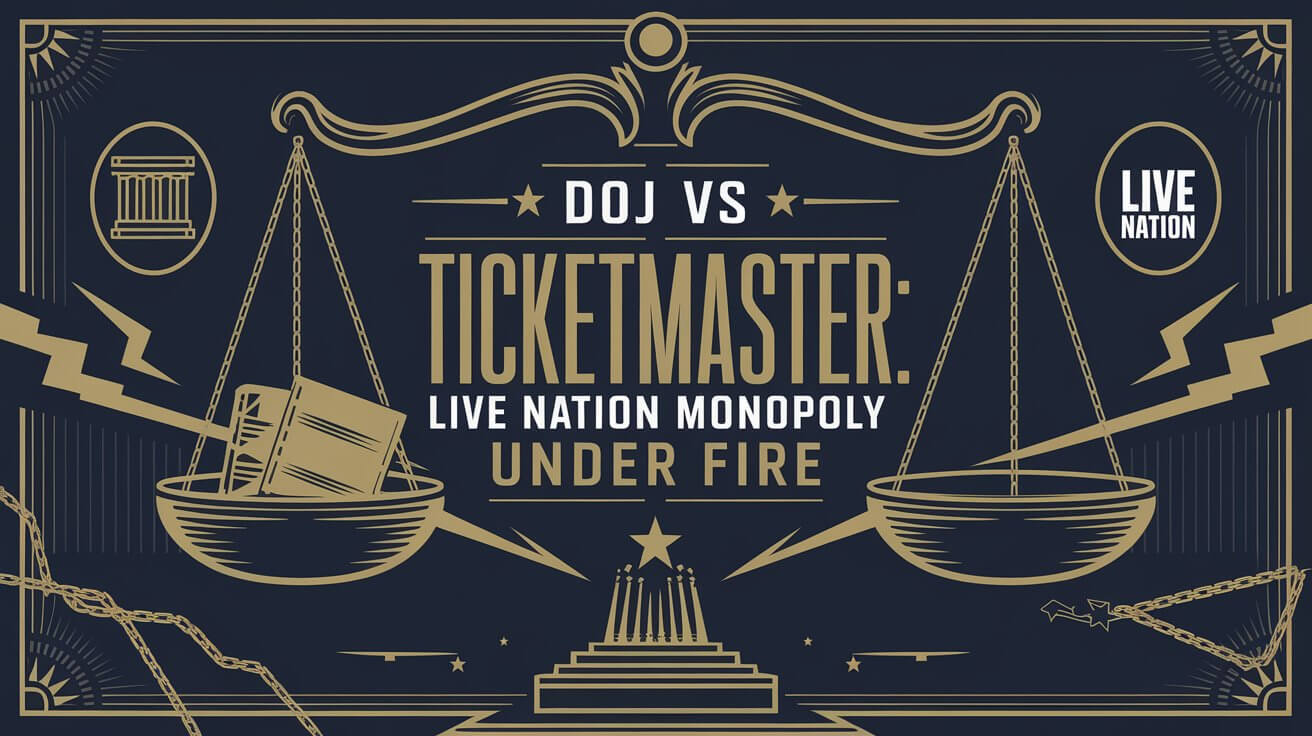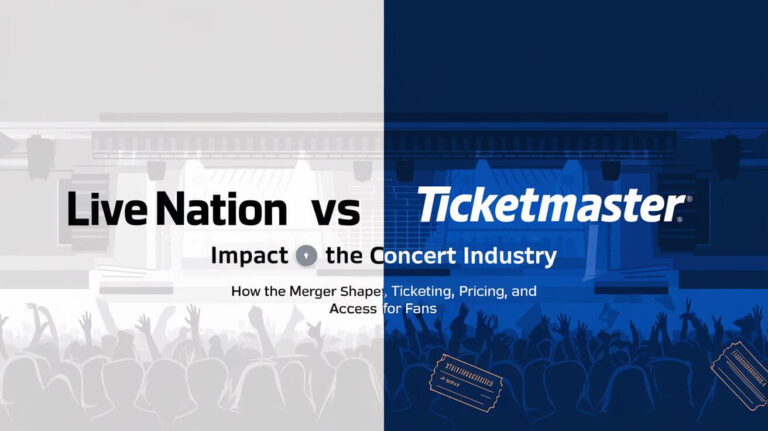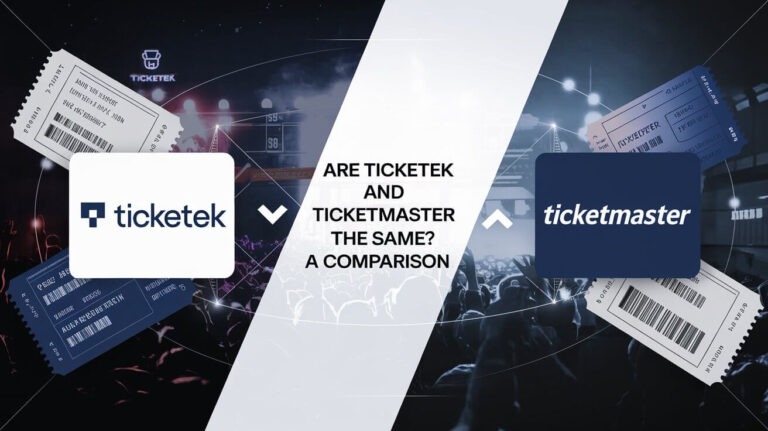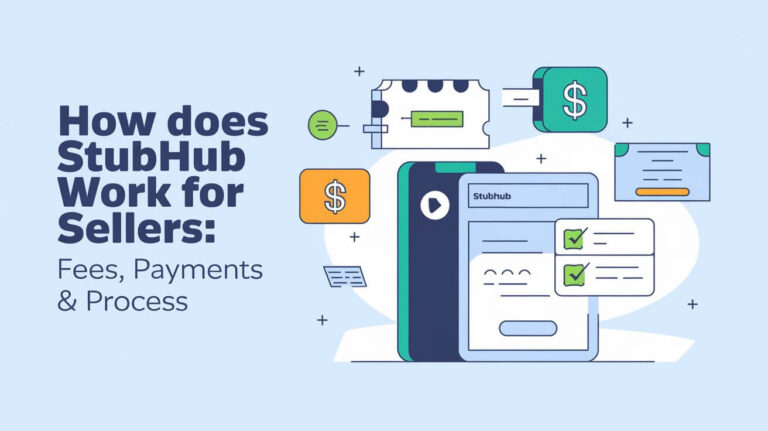
Is the live entertainment industry facing a monopolistic crisis? The U.S. Department of Justice believes so, filing a civil antitrust lawsuit against Live Nation Entertainment Inc. and Ticketmaster LLC. This legal battle could significantly alter the multi-billion dollar live event ticketing market. It will have profound effects on both artists and music fans.
The Rise of Live Nation-Ticketmaster Empire
The live music industry has seen a significant consolidation over the past decades. Live Nation Entertainment Inc. has emerged as the leading player. It owns or controls over 265 concert venues in North America, including more than 60 of the top 100 amphitheaters in the United States. The company generates over $22 billion annually from concerts, ticketing, and sponsorship, solidifying its market dominance.
Historical Market Consolidation
The merger between Ticketmaster and Live Nation in 2010 created Live Nation Entertainment. This merger was approved by the Department of Justice. Ticketmaster, a wholly-owned subsidiary of Live Nation, controls over 80% of the primary ticketing market, a position it has maintained in the subsequent years.
Dominant Market Position
Live Nation’s market dominance is further reinforced by its control of over 60% of concert promotions at major concert venues across the country. The company also directly manages more than 400 musical artists, giving it significant leverage in the concert promotions and primary ticketing markets.
Business Model Evolution
The growth of the live music industry has been remarkable. Revenue from concert ticket sales in the United States increased from $1.5 billion in 1999 to $4.6 billion in 2009. This surge in earnings has been driven by the scarcity of superstar artists capable of drawing large crowds, with fewer than 100 artists worldwide possessing this ability. Live Nation’s business model has evolved to capitalize on this trend, with artists’ managers and booking agents typically earning commissions of 15% and 5%, respectively, of the artist’s income.
DOJ vs Ticketmaster: Antitrust Battle Begins
The U.S. Department of Justice (DOJ) has initiated a legal challenge against the Live Nation-Ticketmaster empire. They accuse the company of engaging in monopolistic practices in the live entertainment sector. The DOJ’s lawsuit, filed in the U.S. District Court for the Southern District of New York, aims to dismantle the Live Nation-Ticketmaster monopoly. This move is designed to promote fair competition, benefiting both consumers and artists.
The complaint alleges that Live Nation-Ticketmaster has abused its dominant market position. Assistant Attorney General Jonathan Kanter stated that the live music industry in America is “broken.” He attributed this to Live Nation-Ticketmaster’s illegal monopolistic control.
The statistics reveal a concerning trend:
- Live Nation Entertainment Inc. generates over $22 billion in global annual revenue from concerts, ticketing, and sponsorship and advertising.
- Live Nation owns or controls more than 265 concert venues in North America, including over 60 of the top 100 amphitheaters in the U.S.
- Ticketmaster is significantly larger than its closest competitor in concert ticketing services in the United States.
- Live Nation-Ticketmaster has maintained monopolies in concert promotions and primary ticketing markets, limiting competition.
The DOJ’s legal battle seeks to address the harmful effects of this monopolistic control. It aims to protect consumer rights and ensure fair competition in the live entertainment industry.
Monopolistic Practices Under Scrutiny
The Department of Justice (DOJ) has accused Live Nation-Ticketmaster of engaging in exclusionary conduct, market control, and anticompetitive behavior. These actions reinforce the company’s dominance in the live entertainment industry. The practices include exploiting its relationship with Oak View Group, retaliating against potential entrants, and threatening venues that work with rival ticketing services.
Venue Control and Exclusivity
Live Nation-Ticketmaster is accused of locking out competition with long-term exclusive contracts. This blocks venues from using multiple ticketing providers. The company controls over 80% of ticket sales at major concert venues in the United States, according to the DOJ lawsuit.
Artist Management Leverage
Live Nation’s direct management of over 400 musical artists, combined with its grip on venue access, is seen as a significant anticompetitive behavior. This entrenches its market dominance. It restricts artists’ ability to work with alternative ticketing platforms, solidifying Live Nation-Ticketmaster’s hold on the industry.
Price Control Mechanisms
The DOJ’s lawsuit highlights Live Nation-Ticketmaster’s alleged use of various pricing control mechanisms. These include blocking venues from offering lower-priced tickets and imposing high service fees. These tactics maintain market control and stifle competition, leading to consistently high ticket prices for consumers.
“The Department of Justice’s lawsuit against Live Nation and Ticketmaster is a significant step in addressing the exclusionary conduct and anticompetitive behavior that has plagued the live entertainment industry for far too long,” said the National Independent Venue Association.
Impact on Concert Ticket Pricing
The legal battle between the Department of Justice (DOJ) and Live Nation-Ticketmaster has sparked concerns about concert ticket prices and fees. The DOJ alleges that Live Nation’s market dominance and anti-competitive actions have led to higher costs for fans. This has made attending live events more expensive for consumers.
Live Nation counters that it doesn’t set ticket prices, which are determined by artists. The company claims it only keeps a small part of service fees. It also points out that primary ticketing is relatively cheap compared to other digital distributions. Live Nation’s profit margin is also at the lower end of the S&P 500 companies.
Despite the ongoing lawsuit, concerns persist that it may not immediately lower ticket fees or consumer costs. The intricate nature of live event pricing strategies and the numerous stakeholders involved make it a difficult issue to address.
| Key Statistic | Value |
|---|---|
| Increase in Live Nation Venue Attendance (2019-2023) | 20% |
| Live Nation’s Net Profit Margin Ranking | Lower End of S&P 500 Companies |
| House of Representatives Vote on TICKET Act | 388-24 |
The pandemic has significantly impacted the live events industry, causing many promoters to leave due to event restrictions. This reduced competition among promoters for venues. It has likely contributed to higher ticket prices and fees for consumers.
The outcome of the DOJ’s lawsuit will have significant implications for the industry and consumers. The legal battle is expected to be long and complex. It could lead to substantial changes in the live event ticketing market.
Consumer Rights and Fan Experiences
The concert-going experience has become a source of growing frustration for many music fans in the United States. The ticket purchasing process often feels convoluted. High ticket prices, dynamic pricing, and a myriad of service charges add up significantly to the overall cost.
Industry data shows the average ticket price for top-grossing concerts has risen by a staggering 26% over the past five years. Service fees can add an average of 27% to the final ticket purchase. This further strains the wallets of eager fans.
Ticketing Process Challenges
Fans have expressed concerns over the complex and opaque nature of the ticket purchasing process. Many feel the system is rigged against them. Tickets often get snatched up by bots or resellers before the general public can access them.
This has led to a growing sense of fan frustration. Fans struggle to secure tickets to their favorite artists’ events.
Service Fee Controversy
- Fans have long decried the high service charges imposed by ticketing giants like Ticketmaster. Some find it more affordable to attend international concerts due to lower domestic prices and fees.
- Artists like Zach Bryan have attempted to challenge Ticketmaster’s dominance. But they have faced significant hurdles in changing the system, which has become deeply entrenched in the live events industry.
| Metric | Value |
|---|---|
| Average Ticket Price Increase (5 years) | 26% |
| Average Service Fee Addition | 27% |
As the battle between the Department of Justice and Ticketmaster continues, the rights and experiences of music fans remain at the heart of the ongoing debate. The industry must address these concerns. It must ensure a more equitable and accessible live event ecosystem for all.
Live Nation’s Defense Strategy
The Department of Justice (DOJ) is challenging Live Nation Entertainment in a significant antitrust case. Live Nation is fiercely defending itself against the DOJ’s accusations of unfair business practices. The company’s defense strategy focuses on several critical points to refute the DOJ’s claims. It aims to prove Live Nation’s role as a key player in the competitive live entertainment market.
Live Nation argues that the live events industry has grown more competitive, with Ticketmaster’s market share decreasing since 2010. The company presents financial data to show it lacks monopoly power. Live Nation also criticizes the DOJ’s stance as overly restrictive, suggesting that vertical integration benefits competition.
Further, Live Nation notes that the Obama Administration approved the Live Nation-Ticketmaster merger. This approval, the company says, shows there was no legal reason to question the merger’s vertical aspects at the time. This, Live Nation believes, weakens the DOJ’s current position and questions the validity of the antitrust allegations.
As the legal fight goes on, Live Nation’s defense aims to show its business model benefits artists, venues, and fans. Despite the DOJ’s concerns about Live Nation’s dominance in live events and ticketing, the company is determined to prove its practices are fair and beneficial.
Market Competition Analysis
The ongoing legal battle between the U.S. Department of Justice (DOJ) and the Live Nation-Ticketmaster merger sheds light on the significant barriers to market competition in the live event ticketing industry. Ticketmaster, the dominant player, controls a substantial share of the primary ticketing market, holding around 70%. Its parent company, Live Nation, has amassed a 60% share of the concert promotion market over the past 15 years.
These market dynamics have created formidable entry barriers for potential ticketing competitors. Ticketmaster’s exclusive contracts with venues, covering over 75% of major concert ticket sales, make it challenging for alternative platforms to gain a foothold. Live Nation’s vertical integration and leverage over artists have enabled the company to stifle competition and maintain its stronghold on the industry.
Alternative Ticketing Platforms
While some alternative ticketing platforms, such as SeatGeek and AXS, have emerged, they have struggled to make significant inroads against Ticketmaster’s dominance. These competitors face an uphill battle, as they must overcome Ticketmaster’s entrenched position, exclusive venue contracts, and Live Nation’s market power. The DOJ alleges that Live Nation’s practices actively prevent new promoters and ticketing providers from competing on merit.
Industry Innovation Barriers
The lack of competition in the live event ticketing market has also stifled industry innovation. Ticketmaster’s dominant position has allowed it to maintain control over pricing, service fees, and the overall ticketing experience. Consumers have long complained about the high fees and opaque ticketing practices, but Ticketmaster’s market power has made it difficult for alternative providers to offer more transparent and cost-effective solutions.
| Metric | Ticketmaster | Industry Competitors |
|---|---|---|
| Market Share | 70% | 30% |
| Exclusive Venue Contracts | 75% | 25% |
| Concert Promotion Market Share (Live Nation) | 60% | 40% |
“Ticketmaster’s dominance provides powerful incentives to leverage market power into adjacent markets, and the DOJ failed to restore competition in live events markets after the 2010 merger, with imposed conditions proving ineffective.”
Legal Battle Implications
The U.S. Department of Justice (DOJ) has filed a landmark antitrust lawsuit against Live Nation-Ticketmaster. This move is a significant step in the live event ticketing industry. It echoes the historic Microsoft case from the late 1990s, marking a major antitrust enforcement action.
The DOJ accuses Live Nation, Ticketmaster’s parent company, of abusing its market dominance. It alleges anti-competitive practices. Live Nation controls 80% of primary ticket sales for the nation’s largest venues, limiting competition and consumer choice.
| Key Statistics | Data |
|---|---|
| Live Nation’s Market Share | 80% in primary ticket sales for largest venues |
| Live Nation’s Profits | $23 billion in 2022, a 36% increase from the previous year |
| Live Nation’s Argument | The 80% market share only applies to a small fraction of venues it operates in, not representative of the market as a whole |
The DOJ’s lawsuit seeks to dismantle the Live Nation-Ticketmaster monopoly. It could set a precedent for antitrust actions in the entertainment and beyond. The outcome will impact antitrust enforcement, industry restructuring, and legal precedents.
As the case progresses, the live event industry and consumers wait for the court’s verdict. It could lead to a more competitive and consumer-friendly ticketing market.
Potential Industry Restructuring
The Department of Justice (DOJ) is taking on Live Nation-Ticketmaster in a legal battle. This could lead to a major overhaul in the live entertainment industry. The DOJ wants to split the concert promotion and ticketing businesses, sell off venues, or tighten regulations on the company.
Breakup Scenarios
Experts think the breakup of Live Nation-Ticketmaster could be similar to AT&T’s. AT&T was broken up in two years, affecting a million employees, 70 customer accounts, 25,000 buildings, and 175,000 vehicles. The DOJ’s push for changes could make Live Nation and Ticketmaster operate separately. This could end their long-held market dominance.
Market Reform Possibilities
Reforms could also include making ticketing more transparent, regulating secondary markets, and boosting competition. The Biden administration wants to ban “junk fees” in the industry. This move aims to tackle high fees and lack of competition in ticketing.
Such reforms could change the industry’s competitive landscape. They could give more power to artists and consumers.rts the antitrust lawsuit against Live Nation-Ticketmaster. A 2023 poll showed over 60% of Americans back breaking up Ticketmaster. Garland’s leadership shows the DOJ’s dedication to consumer protection and fair competition in live music.





